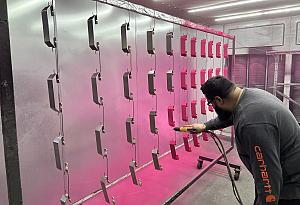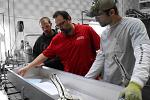- FMA
- The Fabricator
- FABTECH
- Canadian Metalworking
Categories
- Additive Manufacturing
- Aluminum Welding
- Arc Welding
- Assembly and Joining
- Automation and Robotics
- Bending and Forming
- Consumables
- Cutting and Weld Prep
- Electric Vehicles
- En Español
- Finishing
- Hydroforming
- Laser Cutting
- Laser Welding
- Machining
- Manufacturing Software
- Materials Handling
- Metals/Materials
- Oxyfuel Cutting
- Plasma Cutting
- Power Tools
- Punching and Other Holemaking
- Roll Forming
- Safety
- Sawing
- Shearing
- Shop Management
- Testing and Measuring
- Tube and Pipe Fabrication
- Tube and Pipe Production
- Waterjet Cutting
Industry Directory
Webcasts
Podcasts
FAB 40
Advertise
Subscribe
Account Login
Search
Culture matters: Employee-driven problem-solving
- July 11, 2006
- Article
- Shop Management
 |
Editor's Note: This column was prepared by the staff of Winning Workplaces, a not-for-profit organization that helps small and midsized businesses create better work environments.
Ford Motor Co.'s and General Motors' supply chains have had an extremely difficult past couple of years. As a result, their largest suppliers, Federal-Mogul, Tower Automotive, Collins & Aikman, Delphi, and most recently Dana, have declared bankruptcy.
In late January The Wall Street Journal reported on Ford's current change initiative, "Way Forward." The article referenced a sign on the wall of the project "war room" that states, "Culture Eats Strategy for Breakfast." That same month Time magazine noted that William Clay Ford Jr. "believes that nothing short of a cultural revolution will save the family firm."
The automotive industry once dominated the U.S. economy as America's love for automobiles led to an insatiable appetite for new designs and models. In addition to the major automakers, thousands of smaller manufacturers and suppliers thrived as well. Yet roughly 30 years ago foreign manufacturers such as Toyota began to threaten Detroit's dominance. In attempts to be competitive, U.S. manufacturers have tested myriad new business models and strategies—with mostly disappointing results.
Years of industry dominance and unchallenged growth left U.S. automakers with practices and assumptions that hampered their ability to solve problems with fresh perspectives. Hierarchical, bureaucratic, and risk-averse cultures have made the Big Three inflexible and unresponsive to change. Bill Ford seems to understand this, and as he told a Time reporter, "I want to find a different way." One hopes that the leaders of Delphi, Dana, Federal-Mogul, Tower, and Collins & Aikman understand this as well.
Turning Inward for Inspiration
The automotive industry is not alone in facing unprecedented global challenges, which require innovative thinking. Finding a different way requires fresh perspectives and new insights, which often emerge from the heart of organizations—employees. True innovation requires a long-term commitment, a tolerance for trial and error and mistakes, a learning environment, and a willingness to involve employees in problem-solving.
In "Management Innovation," an article in the February 2006 Harvard Business Review, Gary Hamel referred once again to the automotive industry: "Unlike its Western rivals, Toyota has long believed that first-line employees can be more than cogs in a soulless manufacturing machine; they can be problem-solvers, innovators, and change agents." Toyota, with its ability to harness the intellect of "ordinary" employees, is now setting the standard for the industry, Hamel wrote.
Engaging employees in problem-solving represents a cultural revolution for many industries. Hamel sees it as a "marked departure from traditional management principles." He goes on to identify employee-driven problem-solving as one of a dozen management innovations of the 20th century that provided pioneering companies with a competitive advantage.
A Built-in Resource
Data regarding employee satisfaction indicates that employees would welcome another way as well. According to a 2005 study by The Conference Board, only 49 percent of employees are satisfied with their jobs, the lowest percentage to date. Watson Wyatt found in a 2004 study of 12,750 employees that only 39 percent trusted senior management; 69 percent said that communication in their organization was poor; and only 32 percent said they felt motivated to perform well.
Companies that have turned to employee-driven problem-solving tools find that employees are more apt to invest discretionary effort in their work. Those companies experience lower turnover and absenteeism, demonstrate more resilience, and uncover innovative solutions to an array of business problems. They find that an invitation to bring their best talents to work is precisely what many employees are looking for. And they can point to business results to validate it.
Building an employee-engaging culture requires dramatic change for many organizations. While this kind of fundamental change is difficult and requires a long-term commitment from leadership, it's often the best means of renewal and survival for an organization. As Bill Ford said, "The outcome matters not just to our company, but to our country."
Winning Workplaces, 1603 Orrington Ave., Suite 1880, Evanston, IL 60201, 847-328-9798, fax 847-328-2224, info@winningworkplaces.org, www.winningworkplaces.org. Winning Workplaces' fourth annual Best Bosses Conference and Celebration will be held Sept. 27, 2006, in Chicago.
subscribe now

The Fabricator is North America's leading magazine for the metal forming and fabricating industry. The magazine delivers the news, technical articles, and case histories that enable fabricators to do their jobs more efficiently. The Fabricator has served the industry since 1970.
start your free subscription- Stay connected from anywhere

Easily access valuable industry resources now with full access to the digital edition of The Fabricator.

Easily access valuable industry resources now with full access to the digital edition of The Welder.

Easily access valuable industry resources now with full access to the digital edition of The Tube and Pipe Journal.
- Podcasting
- Podcast:
- The Fabricator Podcast
- Published:
- 04/16/2024
- Running Time:
- 63:29
In this episode of The Fabricator Podcast, Caleb Chamberlain, co-founder and CEO of OSH Cut, discusses his company’s...
- Industry Events
16th Annual Safety Conference
- April 30 - May 1, 2024
- Elgin,
Pipe and Tube Conference
- May 21 - 22, 2024
- Omaha, NE
World-Class Roll Forming Workshop
- June 5 - 6, 2024
- Louisville, KY
Advanced Laser Application Workshop
- June 25 - 27, 2024
- Novi, MI































